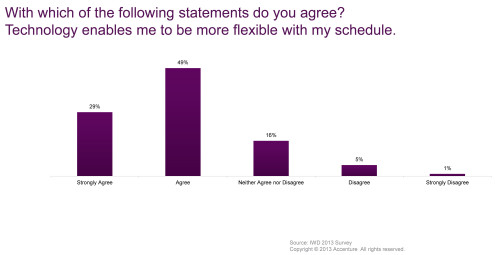Does technology really help us in our endeavor for work-life balance?
This is not a new question, but it remains an open one – if you believe that there is such a thing as work-life balance.
I’ve always had a problem with this description and it drives me nuts. The issue is to what degree does work define your life, drive your life, and how do you make choices to live a full life – not a life just filled with work.
But all that aside, my initial response would be that technology aids us in our quest for a balanced life “A LOT,” for the idea of working without the convenience of modern technology is certainly painful to contemplate.
Does technology help, or make things worse?
I would argue, however, that while we all shudder to think of life without remote access, the true relationship between technology and work-life balance may not be as simple as we think.
Though helpful, the use of technology provides no automatic guarantee of a more balanced work and personal life, and we would be remiss if we didn’t remind ourselves of this from time to time. I found myself reflecting on this while reading the results of a 2013 global research study conducted by Accenture.
Accenture conducted an online survey of 4,100 business executives from medium to large organizations across 33 countries in order to gain insight on behaviors and attitudes towards women’s careers. One series of results stated “78 percent of respondents agreed that technology enables them to be more flexible with their schedules.” However, “70 percent of respondents also agreed that technology brings work into their personal lives.”
These two sentiments seem to be in diametric opposition to each other. So what’s the bottom line here? Is technology really helping us balance our work and our personal lives?
These results would lead me to argue that I’m not the only one still feeling quite conflicted.
Finding what works for you
The ability to have a flexible schedule because of the technology at our finger tips provides a great resource for better balancing work and our personal lives. However, at the very same time these statistics point out that technology’s influence on flexibility can just as easily undermine our quest for life balance as it can help it.
This is valuable information. It informs us that to capture the positive benefits of technology on work-life balance we much be proactive in our use of technology, set boundaries around our use, and be aware of what this use entails.
Just as we seek to be informed consumers, we must be informed users, and recognize that for technology to help and not hurt our endeavors for life balance we must set personal boundaries in our use. Perhaps this means asking ourselves some “when, what, where, and why” questions about our use of technology. Or maybe this means creating accountability by telling a family member that we will only check email for a certain amount of time while on vacation.
There are many options; it’s just a matter of finding one that works for you.
These diametrically opposing statistics also allow us to question the very definition of work-life “balance.” If technology helps us balance life and work as much as it hurts us balance them, I find myself wondering if there was really much “balancing” going on in the first place?
Creating a sense of life harmony
Perhaps it’s antiquated to think of work and our personal lives as two separate things we can place on a scale. Instead we could look to these statistics as a clue that true work-life “balance” is not something we can objectively measure on a scale, but the feeling of “having it all” that comes from leveraging the people, places and things in our lives (like technology) to create a sense of harmony.
We’ve all read the articles; we’ve heard the debates about whether technology hurts us, helps us, is “good” or “bad,” and we know that technology and the ensuing ability to work from anywhere has probably left traditional “office walls” gone for good.
Ultimately though, the question of whether or not technology helps or hurts our search for life balance can only be answered on an individual basis, and it is our individual use and personal choices that will determine whether or not technology helps us balance our work and personal lives, or if it tips the proverbial scale.
This originally appeared on China Gorman’s blog at ChinaGorman.com.
